Memoirs & Diaries - Captivity in the Ardennes
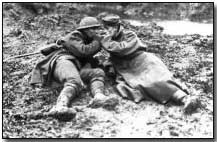 I shall never forget the
morning of March 28th, 1918, when I watched our trenches and the familiar
landmarks disappear under the intense bombardment of hundreds of
minenwerfers - those earthquakes in miniature.
I shall never forget the
morning of March 28th, 1918, when I watched our trenches and the familiar
landmarks disappear under the intense bombardment of hundreds of
minenwerfers - those earthquakes in miniature.
I watched and waited in a state of mental numbness or apathy, and at last the bit reserved for me hit me in the head. When I took a further interest in matters I was a prisoner.
Yet the memory of that morning and of the months in France that preceded it are not so vivid as the memories of my captivity.
After spending a few hours in a prisoners' cage I was given a bag containing some biscuits, and a German soldier, no doubt pitying my bandaged head and my youthfulness, gave me his ration of "coffee". This action impressed me very favourably at the time, as we were conjecturing on the treatment we were going to receive.
Then we started to march. A Uhlan, complete with lance, rode at the head of the column and another at the rear. We marched without a single halt all through the afternoon, and reached our destination - Douai - about eleven o'clock.
That march became a very tragic procession towards the end, and I have no doubt that it would have been more tragic if any of us had fallen out.
At Douai we spent a nightmare of a night. We were herded into a long, low building once used for storing coal. This place was already packed with English prisoners, and someone had lit two huge fires, one at each end. All through the night we stood there - it was only with difficulty that I could turn round - and the red glare of the fires, the pitch blackness of the shadows, and the groans, cursings and stench of perspiring humanity gave me a good impression of the ancient idea of Hell.
At last the door was unlocked and we stumbled into the blessed rain-laden air. We resembled coal-men. Although my head was throbbing painfully, I considered myself lucky, as all the wounded were sent to a large, clean building with wire beds.
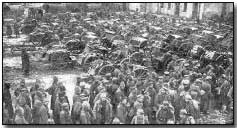 Here
I made my first acquaintance with German black bread, and after drawing two
wisps of straw from my portion I decided I did not want it. Later on I
was not so particular.
Here
I made my first acquaintance with German black bread, and after drawing two
wisps of straw from my portion I decided I did not want it. Later on I
was not so particular.
After Douai, Denain, where we realized the full meaning of captivity. There were days of idleness divided by "meals" of bad black bread and "soup" made from dried mangel-wurzels. This horrible stuff was the cause of daily cases of dysentery.
We travelled from place to place until a party of us arrived at some saw mills near Tannay, in the Ardennes. We were arranged in groups according to our civil occupations. I was a clerk, but having heard good things about working on a farm I decided I was a farmer's boy-only to find that my job was to load trucks with heavy planks of wood.
The country around was beautiful, the weather glorious, and if we had had sufficient food we might have been to some degree reconciled to our lot, but every day our plight appeared more hopeless: every day we became a little weaker. How we managed to work at all surprises me now.
Our rations were a slice of black bread every evening with sometimes a small herring, and soup at midday, consisting of horse beans and a few small cubes of meat. There was "coffee" in the morning.
The sleeping quarters were of wood and so old that the beams and roofs were alive with wood lice and bugs, which dropped on our faces as we tried to sleep, and gave out a horrible smell when squashed. When we complained, our guards thought it a huge joke.
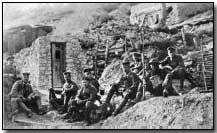 At
last most of us slept out of doors. If only we could have stopped
dreaming about food! Food! That was all we thought and talked about.
At
last most of us slept out of doors. If only we could have stopped
dreaming about food! Food! That was all we thought and talked about.
We mentally prepared and partook of most elaborate banquets. I used to sleep with a fellow of my own age and we told each other of our favourite dishes.
What feasts we spread as we lay together beneath the stars! Every evening with great will power I managed to save a portion of my bread ration for the morning, putting it inside the straw mattress on which I lay to make sure of it.
Yet in the morning it was always gone. I thought that I must have eaten it during my sleep. It was only after some weeks that I learned that my bed-fellow had been caught in hospital taking other men's rations. I had never suspected him.
A man who was a lay preacher held services, which I attended. The Germans laughed and mocked at us from the other side of the wire. Yet that man, though urging us to pray for strength to endure and play the game, was caught stealing his fellow prisoners' food.
One man made a bowl of soup which he placed by an open window to cool. He turned his back for a few seconds and when he turned round again it was gone.
Hunger at last made me part with my wrist-watch - the only article of value I had besides my boots. It was a great moment of decision when I took it to the Italian cook. He gave me a small sack of dried crusts of bread, kept back from our rations, no doubt.
I put one or two crusts in my pockets and smuggled the sack under my greatcoat into my sleeping box. But many pairs of eyes must have noticed my sudden stoutness. I left the place for about half-a-minute and when I returned not even the sack remained. And still those eyes looked at me, blandly and innocently.
It was a true saying in those days that "An Englishman was an Englishman's worst friend". If a German was in charge of the food store we were sure of obtaining our fair ration, but a fellow prisoner in charge would soon grow fat at our expense. Still we were all mad for food, and madmen cannot be made responsible for their actions.
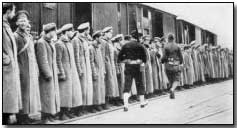 The
most dreadful thing about captivity is the loss of that spirit of
comradeship which on the other side of the line kept men decent in the most
trying circumstances. I sensed this change in relation to one another
soon after I was captured, and before very long it was every man for himself
at any cost.
The
most dreadful thing about captivity is the loss of that spirit of
comradeship which on the other side of the line kept men decent in the most
trying circumstances. I sensed this change in relation to one another
soon after I was captured, and before very long it was every man for himself
at any cost.
No pity or kindness was to be found behind barbed wire enclosures, and the weakest went first. Hunger made hatred universal. For this reason I was glad I had become separated from those with whom I had been captured. Often I wondered how men of the same race could be such beasts to one another.
In charge of us was a huge bearded German sergeant-major whom we called "Bluebeard". He was a typical German bully, with a hatred for us that one only found in those who had never been to the Front. There was also a sergeant under him who was just the opposite, but this sergeant had lost an eye in the trenches.
At roll-call one evening I overslept myself, and after half-an-hour's search this sergeant discovered me - a very small portion of humanity curled up in my box blissfully unaware of the uproar in the camp over my disappearance. I was greeted by my fellow prisoners with howls and curses for making them wait so long.
Out of the corner of my eye I could see "Bluebeard" getting his big stick ready for me, but the sergeant had seen him as well and putting himself between me and "Bluebeard" he pushed me into the back rank of the crowd. I was placed in a cell as punishment and was anticipating a pleasant night's sleep - for the cell was the only clean place in the camp - when about ten o'clock old "One-eye" came along to release me with a fatherly pat on the head.
There was another unpleasant person at this place; a white-haired, blue-eyed German in charge of our working party. With my head still plastered he gave me the job of loading coal with a huge shovel. I could only manage a quarter of a shovelful at a time, but mistaking my weakness for laziness, he caught hold of me by the throat and nearly choked me
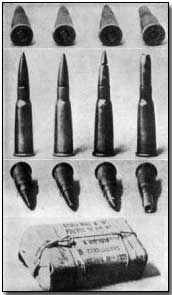 He
learnt my name, and whenever I heard him say with a grin, "Come here, Mr.
Victor Denham," I knew I was "for it".
He
learnt my name, and whenever I heard him say with a grin, "Come here, Mr.
Victor Denham," I knew I was "for it".
By now our numbers had rapidly decreased. Illness and mutilation in the machine shops took toll each day.
It is still a mystery to me how a weak, insignificant boy as I was came through it when fine, strong men went to pieces and disappeared every week.
At last we became too weak to work in the mills any longer, so were drafted off in small numbers to various villages and given the work of hoeing mangel-wurzels - which seemed to be the staple food at the time. We were not trusted with the potato fields.
About this time I became something of a fatalist and considered that every change I made was for the best, so I volunteered for different working parties and was always moving about. At one place the French inhabitants were quite friendly to us, and at one cottage which we used to pass every day the occupants, with the acquiescence of our guards, allowed us to raid their potato store.
What a feast we had that night! But the authority in charge heard of it and the inhabitants were warned that drastic punishment would follow the giving of food to the English prisoners. The villagers resorted to putting potatoes and apples along the roads we had to travel. No one could punish us for finding a potato or apple.
Another move. More mangel-wurzels needed hoeing. Our party numbered about a dozen. And what a party we were! So prematurely aged and weak that our hoes were a necessary aid to getting to work.
At this village a Scotsman was our cook - as we knew to our cost. He soon got fat on what he kept back from our rations and very soon collected hundreds of marks by selling as supper food he had kept back from our dinner. But he was paid in his own coin, for one day all his marks were missing.
His suspicions immediately fell on us and, appealing to our guards - all decent fellows - he made us strip, and then searched our clothes. But he never found his money. The German sergeant who watched the proceedings was much amused; we found out that it was he who had taken the money.
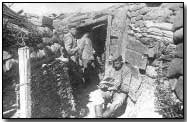 With
his plausible tongue, this Scotsman won the sympathy of the Frenchwoman who
lived next door (we were lodged in a house), and she gave him some good
dinners which he carried past our very noses with such unctuous remarks as
"God bless her!" How I hated him!
With
his plausible tongue, this Scotsman won the sympathy of the Frenchwoman who
lived next door (we were lodged in a house), and she gave him some good
dinners which he carried past our very noses with such unctuous remarks as
"God bless her!" How I hated him!
I was becoming very weak now and it was evident that the guards noticed it, for they would enter our room every night with the remains of their suppers and, after searching round, would discover me in my corner and put what they had brought in my basin.
A German infantry regiment passed us one day. They seemed very dispirited. In front of the column was a scarecrow of a horse. We were told that it was the regiment's meat ration. And so it turned out to be. The inhabitants of the village also had their share and, thanks to them, we were given the head and a few ribs.
The sight of an officer passing along the road by which we were working would act on our guards magically. We would be peacefully working when they would suddenly seize us round the throats and shake us like dogs, calling us all kinds of names.
This was the kind of treatment the officers delighted to see us subjected to. When they had gone normal relations were resumed by our guards.
It was whilst in this part that I commenced to suffer from a form of dropsy. I would be working in the fields and would suddenly discover that my legs seemed rooted to the ground. I then found that they had swollen to twice their normal size.
One day a German commandant visited us and asked if we had any complaints! We were surprised into silence. Any complaints! One of us ventured to say that we should like to write home, and after a few days we were each given a field card to satisfy us. These cards never reached home.
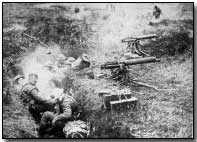 Home!
I tried not to think of it. I did not even know if it still existed.
It might have been bombed out of existence for all I knew. Things were
bad enough as they were, but to think of home and all it meant made one feel
absolutely hopeless.
Home!
I tried not to think of it. I did not even know if it still existed.
It might have been bombed out of existence for all I knew. Things were
bad enough as they were, but to think of home and all it meant made one feel
absolutely hopeless.
One day, as I was hoeing, one of the guards came over to me and gently led me away. I did not worry about what was going to happen to me as I was getting past caring for anything, but I was rather surprised when he made me lie down in the shadow of a hedge and told me I was to work no more.
All that day I rested in the warm sun and compared the country with the English country and thought how happy I could have been if only I were strong again and not hungry.
The next day I could not get up in the morning. I did not want to eat. I only wanted to be let alone, and I had my wish. During the day it seemed as if I had been completely forgotten.
The next day was my birthday. What a birthday! I well remember praying that I might die. Utterly hopeless I had no desire to live. My very body seemed a burden to me. I did not undress at night, but lay in a kind of stupor, not caring for anything or anybody.
But I overheard the others discussing me. A little ginger-haired man whom I disliked for no other reason than that he had a head-wound alive with lice remarked:-
"He won't last much longer. He doesn't wash. He doesn't undress. He doesn't do anything. He just lays there. I know what that means."
I knew what it meant too - and had been hoping for the end, but hearing myself discussed in such a manner awoke what little self-respect and pride I had left. I thought to myself, "I'll show them if I'm done for or not".
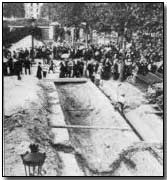 The
next morning, although I had eaten nothing for several days, I managed to
stumble downstairs and out to the working party. The guards seemed
delighted to see me again. Perhaps they did not want to be bothered
with the trouble of a funeral.
The
next morning, although I had eaten nothing for several days, I managed to
stumble downstairs and out to the working party. The guards seemed
delighted to see me again. Perhaps they did not want to be bothered
with the trouble of a funeral.
I did not do any work, but the fresh air and the sunshine helped me to regain a little strength. But it did not last long. Soon I was in hospital in Sedan, so weak that I could not walk; so thin that I could not sit down.
Rifleman Victor Denham joined the London Rifle Brigade at eighteen, and went to France in August 1917. Took part in the battle for Cambrai in November 1917. Shot in the head during the German offensive at Arras, March 1918, and made prisoner of war. Repatriated from Lamsdorf Camp (an unofficial War Prisoners' Camp), December 1918. Discharged, September 1919.
First published in Everyman at War (1930), edited by C. B. Purdom.
Photographs courtesy of Photos of the Great War website.
French tanks were used for the first time in battle on 17 April 1917, when the 'Char Schneider' (as they were known) was used during the Second Battle of the Aisne.
- Did you know?
